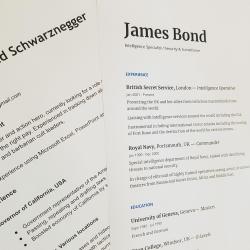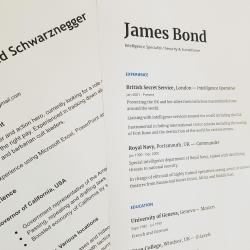How to Write a Resume When You Have Little Experience
Entering the job market for the first time or transitioning to a new career can be daunting, particularly when it feels like your resume is lacking in experience. However, your resume is more than just a list of past job titles—it's a marketing document that showcases your skills, potential, and fit for a role. Here’s how to craft a compelling resume even when you have limited formal experience.
1. Choose the Right Resume Format
When experience is scarce, consider using a functional or skills-based resume format rather than a traditional chronological design. This approach allows you to highlight the skills and capabilities you possess that are relevant to the position, placing less emphasis on the timeline of your work history.
2. Start with a Strong Summary or Objective
Begin with a concise summary or objective statement that outlines your career goals and highlights your most relevant skills. This section should be tailored to each job application, focusing on what you can bring to the company rather than what you hope to gain.
Example:
"Motivated and detail-oriented recent graduate with strong communication and problem-solving skills seeking an entry-level marketing position to leverage digital marketing and social media expertise."
3. Highlight Relevant Skills
Dedicate a section of your resume to showcasing specific skills that relate to the job you're applying for. Draw from various life experiences such as volunteer work, coursework, or hobbies that demonstrate your abilities. Be sure to include both hard skills (e.g., software proficiency, language skills) and soft skills (e.g., teamwork, time management).
4. Emphasize Education and Coursework
If you're a recent graduate or still pursuing your education, place your education section near the top of your resume. Include your degree, major, and any honors or notable achievements. Additionally, list relevant coursework, projects, or research that relate directly to the job.
Example:
Bachelor of Arts in Marketing, University of [Name]
- Relevant Coursework: Digital Marketing Strategies, Consumer Behavior, Data Analysis
5. Leverage Volunteer Work and Extracurricular Activities
Volunteer roles and extracurricular activities can often parallel a work environment, providing you with valuable experience. Describe your responsibilities and achievements in these roles as if they were paid positions, focusing on what you learned and accomplished.
Example:
Volunteer Marketing Assistant, [Organization Name]
- Developed creative content for social media platforms, increasing engagement by 30% over three months.
- Collaborated with a team of five to organize fundraising events that raised over $5,000.
6. Showcase Projects and Freelance Work
If you’ve completed independent projects or done any freelance work, include these experiences. Provide context on what the projects entailed, the skills you applied, and the outcomes or benefits.
Example:
Freelance Graphic Designer
- Created branding materials for local startups, including logos, brochures, and websites.
7. Include Awards and Achievements
Awards, honors, and scholarships can demonstrate your dedication and hard work. List any accolades you've earned that reflect your skills or character.
Example:
- Recipient of the Dean’s List Honor for four consecutive semesters
8. Use Action Verbs and Quantify Achievements
When describing your experiences, use action verbs to convey your impact and responsibilities. Whenever possible, quantify your achievements to give context to your contributions.
Example:
"Increased social media followership by 25% over six months through strategic content planning and engagement."
9. Tailor Each Application
Customize your resume for each job application. Carefully read the job description, and tweak your resume to highlight the skills and experiences that best match the requirements. Use keywords from the job listing to help get past Applicant Tracking Systems (ATS).
10. Proofread and Seek Feedback
Before sending out your resume, proofread it multiple times to catch any errors or typos. Consider asking friends, mentors, or career counselors to review your resume and provide feedback, ensuring it's polished and professional.
Conclusion
Writing a resume with little experience is all about showcasing your potential and ability to learn. By focusing on relevant skills, cleverly presenting your experiences, and demonstrating your enthusiasm for the role, you can create a resume that stands out to potential employers. Remember, every expert was once a beginner—your ability to position yourself as capable and eager is half the battle won.






















